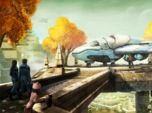 Perhaps out of necessity, science fiction authors tend to have a better grasp of math than your average fiction author.
Perhaps out of necessity, science fiction authors tend to have a better grasp of math than your average fiction author.
I thought it would be fun to take a close look at some of the mathemtical understanding of sci-fi authors, so we can see what happens when these worlds collide.
I'll start with a rather amusing anecdote about John Taine, as posted over on futility closet:
Eric Temple Bell led two lives. By day he was a mathematician at Caltech; by night he wrote science fiction as John Taine.Speaking of math books, no less than sci-fi author Isaac Asimov wrote a book on mental calculation titled Quick & Easy Math. It's out of print now, but used copies are still available.
By a happy chance the two personalities met in 1951, when the Pasadena Star-News asked Taine to review Bell’s book Mathematics, Queen and Servant of Science.
Not one to lose an opportunity, he accepted. “The last flap of the jacket says Bell ‘is perhaps mathematics’ greatest interpreter,’” Taine wrote. “Knowing the author well, the reviewer agrees.”
Popular Science magazine published a condensed version of that book in its December 1964 issue, which is available online for free now, courtesy of Google books. It runs from pages 77-83, and cover mainly the basic arithmetic operations. The style is very conversational, so the concepts are easy to grasp.
Even when sci-fi authors aren't writing math books, they'll try and sneak in math lessons into their sci-fi works themselves. For example, Arthur C. Clarke snuck an unusual lesson about primes in his book The Garden of Rama. The formula's meaning and importance is explained in the following numberphile video:
If you enjoy sci-fi suthors and their taste of math, the best place to indulge yourself is OMNI magazine, and you can find its full run online for free, courtesy of the Internet Archive. Between their stories, their Games column, and the whole futuristic attitude of the magazine, it's easy to get lost in these pages.
Have fun, and enjoy exploring these resources!




No Response to "Math and Sci-Fi"
Post a Comment